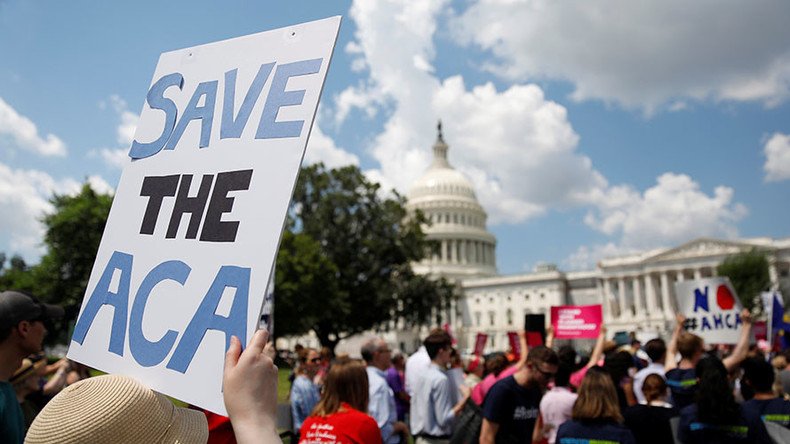It takes two: Senate plans to separate Obamacare repeal bill from replacement

Senate Majority Leader Mitch McConnell has heeded the advice of President Donald Trump as well as fellow Kentucky Senator Rand Paul who have both called for separating the "repeal and replace" strategy of undoing Obamacare, also known as the Affordable Care Act.
READ MORE: GOP Senate healthcare bill loses more votes ahead of Trump meeting at White House
McConnell issued the following statement late Monday evening:
“Regretfully, it is now apparent that the effort to repeal and immediately replace the failure of Obamacare will not be successful.
“So, in the coming days, the Senate will vote to take up the House bill with the first amendment in order being what a majority of the Senate has already supported in 2015 and that was vetoed by then-President Obama: a repeal of Obamacare with a two-year delay to provide for a stable transition period to a patient-centered health care system that gives Americans access to quality, affordable care.”
Earlier, Trump had tweeted a similar idea, calling on Democrats to join in the replacement legislative effort.
Republicans should just REPEAL failing ObamaCare now & work on a new Healthcare Plan that will start from a clean slate. Dems will join in!
— Donald J. Trump (@realDonaldTrump) July 18, 2017
Senator Paul shared the president's tweet.
As @realDonaldTrump and I discussed last week. Clean repeal now! https://t.co/o2V7DeIv4k
— Senator Rand Paul (@RandPaul) July 18, 2017
Earlier Monday, GOP senators realized there was no consensus forming on what to replace Obamacare with, as a total of at least four Republicans vowed not to vote for the Senate version. The House's bill was also a non-starter for many Republicans in the Senate.
A so-called "clean repeal" of Obamacare would go into effect two years after it becomes law. While McConnell says that will provide enough time to transition toward a newly reformed healthcare system, the two-year mark also would come after the 2018 mid-term elections when all House seats are in play and many Senate seats as well.
Former President Barack Obama's signature healthcare reform was passed in 2010 by Democrats, and it immediately became a campaign rallying cry for Republicans who took hold of the House in the following election cycle. Even after gaining a majority in the Senate and winning the White House, however, Republicans have failed in several attempts to get the ball rolling on their own reform package.
Democrats have promised to protect Obamacare from repeal.
Senate Minority Leader Chuck Schumer (D-New York) tweeted against what his party has deemed "Trumpcare."
This second failure of #Trumpcare is proof positive that the core of this bill is unworkable. #ProtectOurCare
— Chuck Schumer (@SenSchumer) July 18, 2017











